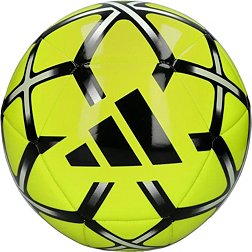How to Choose a Soccer Ball
When selecting your soccer ball, always consider your playing environment. Soccer balls are made specific to artificial turf, outdoor play and hard floors.
Types of Soccer Balls
Match balls are constructed specifically for competition and the sport's high-level training. These balls feature higher quality materials and must conform to regulation standards of your league.
Training and recreational soccer balls are designed to handle extended use on a variety of playing surfaces, often featuring a PVA casing for enhanced durability.
Futsal soccer balls are smaller, heavier and softer than standard FIFA regulation balls. These balls are constructed with either butyl or latex bladders that are wrapped in layers of foam or cloth, lending a softer feel and reduced flight. Shop the full assortment of indoor soccer balls to find a ball for your next game.
Mini soccer balls are small, size 1 soccer balls that can be used for skill training and for general entertainment or collection.
Turf soccer balls are durably designed to handle the wear and tear of rougher playing surfaces like artificial turf.
Beach soccer balls are typically softer and lighter than a standard size 5 soccer ball to provide more comfort while playing with bare feet. Some beach soccer balls may also have water resistant features to prevent any damage from the ocean.
Soccer Ball Materials
Always keep in mind the construction of your soccer ball when making your purchase. Covers are available in synthetic leather, polyurethane and polyvinyl carbonate (or PVC) materials. Synthetic leather is typically designed for high-level play and professional matches. This material delivers up increased control and a highly playable feel.
Polyurethane is more rigid than synthetic leather, but softer and more playable than a PVC ball. PVC, meanwhile, is the most durable soccer ball cover material and ideal for long-term training.
Select between butyl and latex bladders for your soccer ball. Latex is often used in high-end games for its optimal bounce and response. Butyl, however, delivers excellent air retention, requiring fewer refills.
























































